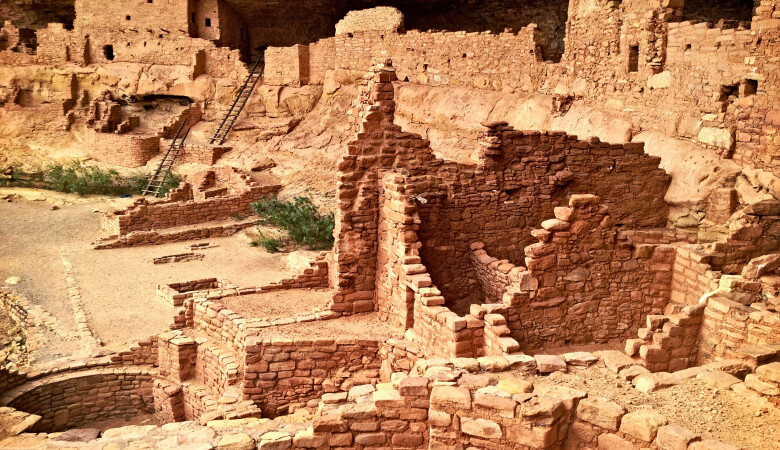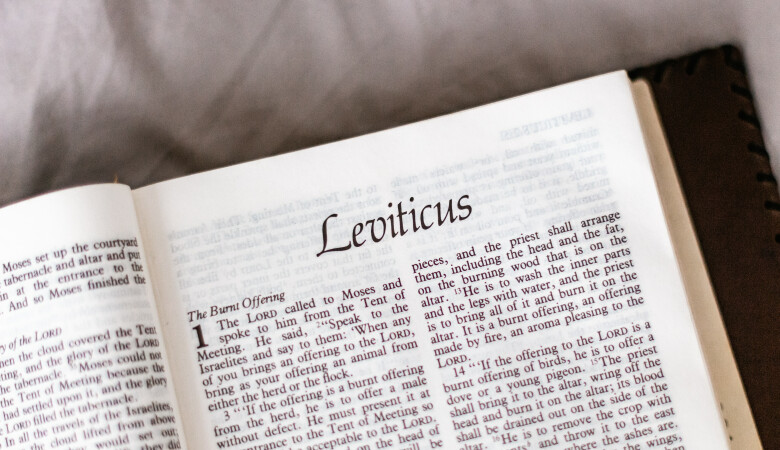Once For All: Christ's Perfect Sacrifice the Goal of History (Hebrews Sermon 37 of 74)
August 21, 2011 | Andy Davis
Hebrews 9:23-28
Judgement Day, Atonement
One Verse Destroys Incarnation
What a privilege I have week after week to stand before you and proclaim the word of God, how awesome is the scripture you heard What I just said from Hebrews four Word of God is living and active, it's an amazing thing that you hold in your laps and I'd urge you to get the Bible and just read along with me as I preach because really, that's all I'm doing. I'm really just taking Hebrews, and going, phrase by phrase. There's not a lot of artistry to it. My goal is, I just want you to understand Hebrews 9:23-28 in context today. That's my goal, but it's just an amazing work. The Scripture is it's a miracle and encounter with eternity, that we have with scripture. And let me give you a clear example of what I'm saying, why I'm even beginning the sermon this way. It has to do with Verse 27, Hebrews 9:27 is the first verse that I ever knew in the Book of Hebrews, early in my Christian life as I was learning how to be a witness and trying to share the gospel, someone told me Hebrews 9:7 was an important verse to memorize, and so I did memorize it. Just as a man is destined to die once and after that, to face judgment, that verse is a fountain of truth. And so many things come from it to refute some of the errors that Satan has sown in the hearts of human beings over time.
Let me take for an example, the issue of reincarnation. The idea of reincarnation, the idea that after we die, our souls are then in some sense born alive again in some other living being, could be an animal or some other living thing, and that you go through life again, and then you die and go through it again. So, life's a big cycle fundamental to Hinduism and Buddhism, these Eastern religions, but it has been infiltrating the west for centuries. It's not a new thing that people in the West have been interested in reincarnation, but it is distressing to me how much that this false idea of reincarnation has made its way into American culture as a whole. There's a lot of media elite people in Hollywood and other places that embrace the idea of reincarnation, make movies like Robin Williams made a movie, What Dreams May Come. It was about reincarnation, Sylvester Stallone holds to this false teaching, Oprah Winfrey has frequently people on who teach based on these kinds of things, Shirley MacLaine, the actress, of course, believes in this, she said "Life is just like showbiz. You do it again and again until you get it right." Well, that's just absolutely wrong.
In Hebrews 9:27, one verse, I tell you, one verse of Scripture is sufficient to explode that false teaching, if you embrace the idea that all scriptures God breathed and that the scripture is perfectly true, then this one text, this one verse is sufficient to destroy the doctrine of reincarnation. A recent poll in 2009 said 24% of American Christians believe in reincarnation, one out of four approximately. That is terrible. It's a false doctrine, it is not true. 31% of European Roman Catholics believe in reincarnation. It's just not true. So I tell you one verse of scripture is sufficient to explode that false doctrine. But it's not just that, there are other false ideas, for example, atheistic materialism, Darwinian evolution. The idea that all we are atoms and molecules. So what that means is that when you die, you're done, you're finished. Parasites eat whatever is left of you and you are gone. There's nothing else, because all you are is a chance assembly of those molecules and whatever it is you think is reality etcetera, is just an accident of time and chance and molecules and physical processes, that's atheistic materialism. That is completely destroyed by this one verse, because it says that it is appointed, we are destined to die once and after that, you see, to face judgment.
So what that means is, there is an after that when it comes to death, something will come for each one of us after death, and that is Judgment Day. So away with atheistic materialism, there is something after death. And it also destroys that false idea that wicked people have that they can escape the consequences of their wicked actions by suicide. I think about Adolf Hitler in that bunker as the Red Army was pressing in and about to capture him. He thought to escape the consequences of his dark crimes by going into a back room with his wife of one day, Eva Braun, and apparently it seems biting on a cyanide capsule. And the peace of death just kind of coursed through his veins, and he just lay on a bed somewhere, and he was gone. And he thought to escape. But Hebrews 9:27 won't let him escape. It's just like in Hamlet, when he said To be or not to be, he's contemplating suicide, he's thinking about ending it all, thinking that he's going to escape the pain of his life and the consequences of his sins and he's trying to escape, but he says to sleep per chance to dream. Aye, that's the rub. Yeah, that's the rub. It's more than just a rub. It's a certainty, There is something after death, and suicide is no escape.
So you cannot kill a bunch of kids at some camp and then kill yourself and think you're going to escape the consequences of your actions, for it is appointed to each one of us to die and after that, to face judgment, and so therefore this one single verse of the Bible is good for witnessing for evangelism. I think it's our job as evangelists, it's my job as a preacher, as a pastor to communicate a sense of urgency about time. This is an urgent matter here. We are all going to die. It is destined for us to die. And I'm going to talk more about this later, but all of us are going to die. And so Richard Baxter, the Puritan pastor, said I preached as a dying man to dying men. Well, I am a dying man. I don't know of any diagnosis against my health right now, but I'm just telling you, this verse tells me I am a dying man, and you may not know any diagnosis against yourself, but you are a dying man or a dying woman if you're listening to me today and I don't care how old you are, you may be young, but you are in the process of dying, and it is destined for you, it's appointed for you to die once, and after that to face judgment. Are you ready for that? Are you ready for judgment day? Are you ready to stand before your maker? Are you ready to stand before the judge of your actions of your motives are you ready for death?
This text stands in front of us and causes us, forces us to look at death, and say, "Am I ready for this?" So yesterday at the outreach and so grateful for Matthew and Zenaida and for all that labored to put on the summer sizzle outreach in the community, Matthew, brother, sweet work, praise God for you. Be patient, be faithful in what you're doing and God will bless what you do. We're sowing seeds in the community. When I see people come to faith in Christ… I was talking to a 14-year-old young African-American gentleman and his friend, maybe he didn't say how old he was, but he's 16, This 14-year-old told me that he was an atheist. I said, "You're too young to be an atheist. How can you be an atheist at age 14?" And so we talked for a while, as long as they would bear, and just the Lord and His grace brought up this verse Hebrews 9:27. Do you know it's appointed to you to die? And after that, to face judgment, whether you're an atheist or not, that's going to happen to you. And then I had the privilege of proclaiming the good news of Jesus Christ and I don't know what effect it's going to have.
There was no obvious positive feedback but I think those are four different ways. This one single verse is powerful in application, but I have in doing that more or less taken it out of context. But we are told, we're always supposed to be interpreting verses in context, we're told as preachers, you have to get the main idea and preach the main thought in the text, and verse 27 isn't even a finished sentence, just as it is, as man is appointed to die once, and after that, to face judgment, dot dot dot, is there a finish to the thought? Is there something else that comes? Well, you have to read verse 28. So Christ was sacrificed once to take away the sins of many people. And there's more in verse 28, but there's the completed thought. And so the central idea here is not any of the things I've been discussing so far. The central idea is that Christ died once for all, the supremacy of the death of Christ never needs to be repeated once for all, for every one of God's people, that will end up in Heaven. It was one sacrifice that got him there, and it's Jesus. That's the meaning of the text.
And so, I'm going to do both, I've already done both. I've already given you the spin-off doctrines and all that, and I've given you the main idea and all of it is valid friends, this is what scripture does it's a river and ocean of truth that flows through your head, that's the beauty of scripture. It's a miracle to me. So we don't have as much time as I'd like to go through these verses, but how powerful is the word of God?
Now what is going on in verses 23-28, we're right in the middle of the doctrinal section of the Book of Hebrews, the author is talking about Christ as our great high priest, who offered the sacrifice of His own blood to God for us in our behalf, and in that way, put an end to all animal sacrifice forever, showed its ineffectiveness, really as anything but a symbolic tool, and ushered in in that way, the new covenant by which we are saved and so the author is going in detail and with some repetition through those concepts, teaching us the significance of the death of Jesus Christ on the cross. And so he's been saying in verses 18-22, that everything in the tabernacle, everything associated with animal sacrifice had to be sprinkled with blood, it had to be cleansed with blood, the blood of the covenant. And it says, in fact the law required that everything be cleansed with blood and without the shedding of blood, there is no forgiveness. That's where we were last time.
I. The Necessity of Purification (vs. 23)
And so the author picks up and says, in verse 23, "It was necessary then for the copies of the heavenly things to be purified with these sacrifices, but the heavenly things themselves with better sacrifices than these." So we're right in the middle of a flow of thought and what the author is saying he's in verse 23, he's giving us the absolute necessity of purification. There must be a purification here. That's what he's giving us, He says it's necessary. He uses a strong word in the original language, it is necessary, it is required, that there be this purification by blood. That's what he's saying, And you would say, "Well why is it necessary, why is it required?" Well simply put, in verse 22, the law requires it, God has commanded it, and therefore it must be done. Well, that's the simple answer, but let's go a little deeper. Why did God command it? What forces drove him to make this command? And it has to do with the twin truth of God's absolute perfect holiness, and our defilement in our sins, and if God is going to have a relationship with us, he must purify us we must be made clean from our sin.
And that purification has to happen with blood. That's what we're saying here. And so it is necessary, then this purification is necessary. I would say if there's nothing else, if there's a central teaching, if we could go to a central teaching, of the character of God, what is God like? We try to understand the main idea of who is God, there's so many things we could say, but I would put my finger on holiness above everything else, that the Scripture wants us to know that God is holy. So, in Isaiah 6:3, the seraphim are calling to one another, "Holy, holy, holy is the Lord Almighty, the whole earth is full of His glory." We've said before, say many times, again, there is no other attribute of God spoken of in that way three times. Holy, holy, holy, God is separate from us, and in every way, I think specifically here, I mean separate from wickedness and evil, and sin. He can have nothing to do with it, 1 John 1:5, "God is light, And in Him there is no darkness at all." God cannot dwell with darkness, he cannot be in the presence of wickedness and so there must be purification, that's what it's saying, and we... Apart from Christ, are wicked we are, defiled apart from Christ, cleansing, we are filthy.
In that exact same passage, Isaiah felt it, you remember that, he says, "Woe is me, I am ruined! I'm a man of unclean lips and I live among a people of unclean lips. I'm unclean. And my eyes have seen the king, the Lord Almighty." When you see God's Holiness, you feel your defilement that you're dirty, you're unclean, because of sin, and you needed cleansing, Just like Isaiah had said earlier, in Isaiah Chapter 1 and when God was saying, I don't want your prayers anymore, I don't want your religious actions. Your hands are filled with blood. Take your evil deeds out of my sight, wash and make yourselves clean. I can't be in the presence of filthy people. So there must be this purification you see, at the end of Romans Chapter 1, the apostle Paul just puts together a series of expressions talking about the wickedness of the human race apart from Christ, He says, that apart from Christ, we are "filled with envy, murder, strife, deceit and malice… Gossips, slanderers, God-haters, insolent, arrogant and boastful, inventors of evil, we disobedient parents, senseless, faithless, heartless, ruthless…" That's unclean, God can't dwell with that. And so we must have a cleansing thanks be to Jesus that there is such a cleansing for a sinner like you and me that we can be clean through the blood of Jesus and so it is necessary, this cleansing is necessary.
Now, what's amazing to me is the copies of those heavenly things. It's necessary for them to be purified. You might say Why. What are the copies of the heavenly things? Well, the beginning of the chapter in Hebrews 9, he talks about a tabernacle, being set up a tent and it had artifacts and it had an Ark of the Covenant, had an altar table where there was a sacrifice made, it had a lamp stand, it had all of these things. Every one of them were crafted and made by human beings, a heavenly vision, of pattern was given, but they were executed by human beings, they were carried out by people, and therefore, defiled. That's what the author's saying even those things done by the direct command of God, because human beings made them, they had to be purified. And I find this quite fastening we're in Bible for Life, with Nathan Finn and we're looking at how the Spirit of God came on Bezalel.
And how the Spirit of God moved him to execute these designs and now Hebrews 9 tells us, once they're done, they have to be purified. That is staggering to me. You can be under the influence of the Spirit doing something God has directly commanded you to do and you need a cleansing and a purification by what you... Because of what you do. And it makes sense, the more you think about it.
Are there any of your good work? So you can say, Okay, I got this one alone, Jesus, I don't need your help on this one. This is a pure good work. I did all by myself. It just doesn't work friends, we are so sinful even our best, good works, even in the power of the Spirit still need a purifying force. We still need this purification so those copies of the heavenly things, the tabernacle, the Ark of the Covenant all of those things had to be purified with those sacrifice the animals. They were good for that. A symbolic cleansing, but nothing else. But the heavenly realities, with better sacrifices than these. Now, this is a deep and difficult phrase. It's my job. I've told you before, to bring you into difficulties that you didn't know you had. That's my gift. You didn't know you had a difficulty but you do because it's your text as much as it's mine. Why did the heavenly realities have to be purified?
And why is the word sacrifice, plural here when the authors are bound to tell us that only one sacrifice offered one time forever does it? Okay, on the second question, I give you a very simple and clear answer. I have no idea. I don't know. I have no better answer if you... Anyway, I don't know why the word is plural. Different commentators… I read them all, I don't know, nobody knows.
Amazingly: The Heavenly Things Needed to Be Purified
But the deeper question, why did the heavenly realities have to be purified? That's difficult for me. Some people say it's because the wrath of God against sin kind of, it's like God had a big wrath fit and once it's done, then you kind of have to clean up heaven. Does that sound good to you? Wrong.
God's wrath is pure and holy, and righteous, altogether. That's not it. Others say, "Well it's because Satan and his angels messed Heaven up as they rebelled and so Heaven needs to be cleaned up from Satan's rebellion." Does that sound good to you? Not to me either. We're not talking about Satan here, we're not talking about demons here, we're talking about human sin. And human sin, how did that get up there? Heaven's a pure place. How do we understand that? John Owen said that what's happening is that the Old Covenant, the animal sacrifices inaugurated or opened up the tabernacle for business, basically consecrated it and dedicated so it could be used. And in the same way, Jesus's blood opens up and consecrates Heaven for us. That would be good except that that's not what the Word says. It's purified. So, with all due respect to John Owen, I don't know, what to do with that one.
Someone else said, "We are ultimately, the Body of Christ is ultimately the heavenly tabernacle where God will dwell with us together." We are the Body of Christ. And we had to be purified. That's better, and maybe right. I think it may be that we are heading toward a perfect world, a new heaven and new earth, the home of righteousness that God intended to dwell with us forever. His throne in our midst, we looking at His face, that's a new world, and that had to be purified because of our sins. He couldn't dwell with us any other way. That's the best I can do with that one. If you want to keep thinking about it, do. That's what the Word of God does. It challenges us to think. But you see the need for purification. Now the rest of the text talks about the purification that was provided and how superior it is, how perfect it is, how effective it is.
II. The Superiority of Sacrifice: Christ Himself (vs. 23)
And so we have the superiority of the sacrifice. Better sacrifices than these. What is that better sacrifice? It's none other than the blood of Jesus Christ. Jesus shed His blood, and that's a better sacrifice than the animals. The blood of bulls and goats and all of those things could not purify from human sin, it's ineffective and so we had to have a better sacrifice and that sacrifice was offered. Jesus Christ shed His blood on the cross for sins. And so it's so beautiful how it says in 1 Peter Chapter 1, "For you know, that it was not with perishable things such as silver or gold that you were redeemed from the empty way of life handed down to you from your forefathers, but with the precious blood of Christ, a lamb without blemish or defect, He was chosen before the creation of the world, but has been revealed in these last times now for your sake, through Him you believe in God who raised Him from the dead and glorified Him and so your faith and hope in God. Now that you have purified yourselves by obeying the truth…" and he goes on. Do you see the blood of Jesus purifies us from sin? 1 Peter 1:18-22.
That's what Peter is saying, that's the purification. We are purified by a better sacrifice and so Jesus's offerings is better than whatever the Levitical priests offer. They offered the blood of bulls and goats and sheep. Jesus offers His own blood and it's superior, it's better.
III. The Superiority of Place: Heaven Itself (vs. 24)
We see also it's better in terms of the location, the place. Where did Jesus offer that blood? Look at verse 24, "For Christ did not enter a man-made sanctuary that was only a copy of the true one, he entered heaven itself, now to appear for us in God's presence." And so we've already seen the man-made sanctuary is the tabernacle. It was made by the command of God. There was nothing wrong with it. It had a purpose. It was made under the inspiration of leading of the Holy Spirit. Bezalel, was filled to the Spirit as he executed those designs.
So nothing wrong with it, but it was man-made. It was earthly. Jesus does His work as our great High Priest, in the heavenly sanctuary. The one not made by human hands. And so Jesus has entered heaven on our behalf, for us. Isn't that sweet? Look at those words, He has entered heaven for us. If you're a believer in Christ, He's entered heaven for you, on your behalf. How majestic is that position, that place? Just meditate. Isaiah 57. Isaiah 57:15, it says, "For this is what the high and lofty one says, He who lives forever and whose name is Holy 'I live in a high and holy place.'" Think about that. "I live in a high and holy place." "But also with him who is contrite and lowly in spirit." Think about that, too. How did we get there? How do we get to go to the high and holy place? Because Jesus went before us, He entered on our behalf as our high priest, and no ironic, no Levitical priest would have ever been permitted to do so. It would have been physically impossible, for no one ever ascended into heaven except the one who came from Heaven, Jesus. And so no ironic priest could ever physically have gone up there and nor would they have been permitted spiritually because every one of them were sinners, offering sacrifices first for their own sins, and then for the sins of the people.
But Jesus has entered heaven on our behalf, and there, He pleads the merit of His blood shed once for all. So look at the superiority of the place God in a high and a holy dwelling place, who looks down from Heaven. Isaiah 40, "He sits and throne above the circle of the Earth, and its people are before Him like grasshoppers." It says in 1 Timothy 6:16, He "Lives in unapproachable light." But Jesus boldly went into the presence of that unapproachable light, to plead the merits of His blood, and bring us there. And so the superiority of place is so clear, so plain. Now, the author is writing this to wean the Jewish believers in the first century, off of the temple. To wean them off. They were raised revering the temple.
In their day, in Jesus's day, it would have been Herod's temple, refurbished by a wicked man, a tyrant, really, but a magnificent building and God was still using it, in the Old Covenant way it was still a place where Anna was there and Simian was there. And there was a godly focus. There's nothing wrong with it in that sense, but they were too attached to it, in some way. Solomon knew the limitations when he made it, he said, "But will God really dwell on Earth?" Is that even possible? "Heaven, even the highest heavens cannot contain you, how much less this building, that I've made." Stephen quotes that in Acts 7, says, "But the Most High does not live in houses built by men." And they stoned Stephen for saying it. That he was speaking against the temple of the Lord. "The temple of the Lord, the temple of the Lord," Jeremiah 7. Just speaking blasphemy against this holy place. Well, it's not blasphemy for Jesus to say, "It's finished, it's done. You don't need the temple anymore, we're finished with it." And so He actually spoke it directly as you remember to His apostles. In Mark 13, they're coming out and He says, they say to Him, "Look teacher, what massive stones, what magnificent buildings." Jesus said, "Do you see all these things? Not one stone will be left on another." Every one will be thrown down. That's pretty plain to me. Do you get it? I mean that's very direct. "No more temple, it's going to be destroyed. You won't need it anymore after I'm done with my work."
So the superiority of the place. The author to Hebrew is trying to wean these first century Jewish Christians off of a focus on the temple on to the heavenly work of Jesus. Don't need the temple anymore. And so that's what he's doing.
IV. The Superiority of Time: Once for All (vs. 25-26)
And so we see also the superiority of time, which I think is the main idea here. Once for all. Isn't that beautiful? Just meditate on that. Once for all. Look at Verses 25 and 26, "Nor did he enter heaven to offer Himself again and again the way the high priest enters the most holy place every year with blood that is not his own. Then Christ would have had to suffer many times, since the creation of the world. But now He has appeared once for all at the end of the ages to do away with sin by the sacrifice of Himself." So the author begins by talking about the superiority of what Christ is doing by way of contrast. He says what He didn't do, in verse 25. He did not enter heaven to offer Himself again and again. So again, speaking gently, but truthfully, I think the idea of the Roman Catholic dry sacrifice for Jesus, offered again and again is just un-Biblical.
He doesn't need to be offered again and again. Jesus when we use this language which skates it a little bit close to that of pleading the merit of His blood, just know He's not offering it again and again. It's been offered. And so what the pleading is the intercession is based on a finished work. It's based on an achieved work once for all. Does that makes sense? So He doesn't need to offer it again and again, He doesn't need to enter heaven again and again, it doesn't have to be done. And the author says if that were so then He would have had to suffer many times, since the creation of the world. You could argue that basically every generation He'd have to be incarnate and die on the cross. And in that sense he would be very little different than the animal sacrifices, ineffective. Like a surgeon who has to go in a second and third time on the same patient and you're like, "Alright do you know what you're doing?" It's ineffective. Or pain medication that wears off, and needs to be taken again. How about one pill that handles the whole thing? Amen.
One pill, infinitely greater one sacrifice that handles the whole thing. And see the power of that. If I told you there were a medication that could take care of the adverse pain in your life, the rest of your life. One pill would you take it? How much would you pay for it? How much infinitely greater than this one sacrifice, once for all, Jesus made? And so, He's greater than these animals that were offered again and again. We'll get into that topic more in Chapter 10, The repetition shows ineffectiveness. We'll get to that, I don't want to say it now, but once for all.
And what that means is that Jesus doesn't have to offer Himself in every generation. He doesn't have to reincarnate and die every generation for the sins of those people, who are at that time. Then Christ would have had to suffer many times, since the creation of the world. But He doesn't need to. Why? Because God has ordained that the cross of Jesus Christ stands in the center of time over all of it. Past, present, future and they're all here in this text. Past, from the creation of the world, until now. Now is right in the text, now is then, you know what I mean, when the author wrote it, the author is saying He doesn't need to suffer again now, He has already done that. And He will not need to suffer again until He returns, and when He returns He's not going to come back to bear sin. He's very clear about that. When He comes back there's no need to bear sin. Why? He's already done that.
Never again, and so the cross of Jesus stands over time, over all of time, this linear time, not like reincarnation, going round and round in a big circle. It's a line. Jesus is the Alpha and the Omega, He's the first and the last, the beginning and the end. That's what He is doing and His death is right in the center, and therefore you know what that means. All of the Old Covenant saints were cleansed the same way that we are, through the blood of Jesus. Isn't that magnificent? Moses's murder, and Noah's drunkenness, David's adultery, and murder, all of the sins of those Old Testament saints were covered by Jesus's blood. Paul makes the same point, in Romans Chapter 3, that God had passed over the sins committed beforehand left them unpunished, because He was going to handle it, at the cross.
Now, what the author is doing here, is he just extends it from that point forward, to the end of time. All sins of God's people, all of them handled by one sacrifice, once for all. And how powerful is that? How awesome is that? And so the author at the end in Verse 27 and 28, just is making this point, "Just as man is destined to die once," emphasis on once "and after that to face judgment, so Christ was sacrificed once for the sense of many people." That's the point he's making. Doesn't ever need to be repeated again, it's therefore effective. And so this is the magnificence of the work of Christ.
V. The Three Appearings of Christ
Now, in the middle of all this, I want you to notice a word that popped up and has become very rich to me, and it's this word appearing or appeared that Christ has appeared, He appears to us. It's used three times, once in verse 24, once in verse 26 and one in verse 28.
And it's a powerful word. It has a sense that of hiddenness. And then He shows up. It's a dramatic word. Isn't it awesome? How many times do you want God to show up? Oh, Jesus, would You just show up here with Your power, with Your might, would You just show up? And He appears here, do you see? It's as though He's in some way hidden for long ages past, as it says in Colossians, and now revealed and made known. I get the picture. Just my mind working in illustrations analogies like cavalry over the hill, you're about to get wiped out, you're going to lose the battle. And the cavalry comes up over the hill with a mighty captain and wins the day, and you win the victory. Or perhaps a court trial, where the trial for an innocent person accused of murder is going very badly until the star witness appears in court. We actually use that word, their appearance in court, they appeared there, and it's dramatic. It turns the day. Save the innocent person or athletic analogy, MVP player injured in the first half, in the locker room, nobody expects to see that person again, then suddenly they show up and win the game. Very dramatic, and so it is also I think in Revelation Chapter 5, when the scroll is in the right hand of the one seated on the throne and it seems like no one is there who can take it and then behold the Lion of the tribe of Judah, He appears. Isn't that awesome?
So I'm going to get out of the order that the author gives us, try to do it reverently but I'm going to reverse it and put it in redemptive historical order.
Incarnation Leading to Crucifixion (vs. 26)
First in Verse 26, the Incarnation leading to the crucifixion, "but now He has appeared once for all, at the end of the ages, to do away with sin by the sacrifice of Himself." Do you see that? He shows up in human form. He appears, born of a virgin, in the fullness of time, He appears. And His appearance goes right to the cross, He appears in front of Pilate, He appears going up the hill, he appears on the cross, He takes away sin, He has appeared for us, to take away sin at the end of the ages by the sacrifice of Himself. I love that phrase, end of the ages, as though this is the culmination of all of human history. The culmination of human history is Jesus appearing at the cross for us, taking away sins.
Ascension and Presentation to God in Heaven (vs. 24)
The second is in verse 24, Christ "entered heaven itself, now to appear for us in God's presence." So after Jesus died, after He rose from the dead, He ascended to Heaven, He then appears for us in the presence of God and just hug those words for us. Jesus is there for you, He's appearing for you in God's presence. Now God the Father expected Him. It's not like He was surprised. "Oh, here's Jesus. Do you have something to say?" Oh no, He knows exactly why the Son is appearing. He is there to open a new enlivening way for us into the very presence of God, and so He has appeared in heaven for us and opened up the way for you and I to go to heaven.
Second Coming Glory to Finish Our Salvation (vs. 28)
But there is one more appearing yet to come, Amen. Do you see it at the end? The second coming of Christ, Christ returning in glory Verse 28, "Christ will appear a second time, not to bear sin." That's done, "But to bring salvation to those who are waiting for Him." That's the future appearing. Are you yearning for that today? Are you able to say "Maranatha come Lord Jesus." That's what John says at the end of the Book of Revelation. Oh, Jesus, come. Come and bring that kingdom come and bring that glory, we're weary of fighting sin and death and wicked people, just come and bring Your kingdom. And so He's going to come, He's going to come bring salvation to everyone who's waiting for Him. So He's not bringing salvation to everybody. Just to those who by faith, by hope are waiting for Jesus to come.
VI. Looking Ahead: Waiting for Christ or Waiting for Judgment (vs. 27- 28)
Is that you today? Are you waiting for Jesus to appear the second time? He's going to come. And so therefore, we are looking ahead as Christians, we are looking ahead, we'll talk much more about this in Hebrews 11.
Faith, the faith chapter is always about looking forward and looking ahead to what's coming. So "just as man is destined to die once and after that, to face judgment, so Christ also is sacrificed once to take away the sins of many people and He will appear a second time, not to bear sin, but to bring salvation to those who are waiting for Him." So death is in your future, you are destined to die. No, I know, I know. There are some biblical exceptions. I love this church. You're a meticulous people. And I appreciate that, I appreciate careful Bible students. You're going to come and talk to me about Enoch. "He didn't die pastor." He walked with God and God took him for he was no more and he could not be found. And you're going to tell me about Elijah, how he went up to heaven in a chariot of fire. And how Elisha watched him go. Look, Enoch and Elijah are a clear exceptions and I still say there's a text that stands over both of them, and that is that flesh and blood cannot inherit the Kingdom of God. So at some point they left their flesh and blood, Amen. They were glad to do it by the way. So I don't know what you call that, but I might call it death but at any rate, it was clearly a different way of getting out of this world than any of us can hope to do. Now, God hasn't said He'll never do it again, and you can keep hoping if you'd like to be the next Enoch or the next Elijah. Go ahead and do it.
But you need to walk with God first, like they did and be faithful in your generation. And you might also tell me some of you sharper thinking ones. You can say, "Yeah, what about all those people that were raised from the dead, in the Bible." Elijah raise somebody from the dead, Elisha raised somebody from the dead, Jesus raised people from the dead, the apostles raised people from the dead. They didn't die once, now, did they pastor? They died twice. Friends, I know that.
This is just the norm here. It could be that you might be raised from the dead, and then die again, 12 years later, that might be in your future. God can do anything. And there is one grand and glorious exception. 1 Corinthians 15 says that the final generation of the human race will not die. "Brothers, I tell you a mystery. We will not all sleep, but we will all be changed." And so, if you are, if we are among that final generation, as we hope to see Jesus come in our day, by the way, if you want to know what the price tag on that is, read about it in the Book of Revelation, if you want to be that final generation. I think a nice time in the ICU, might be better. It's up to you. But see, now I'm saying.
Pre-trib rapture and all that, on and on it goes. Let's debate it endlessly. But at any rate, the fact of the matter is, there is going to be a generation that will not die in the ordinary way. But friends if you're not the next Enoch and Elijah, and if we're not among the final generation, if the Lord wills to tear you for another two or three centuries, you are going to die. You're going to die and the next time you visit a dying friend in the hospital, think as you're ministering to him or her, some day this will be me. Some day I'm going to die. Are you ready? Because after death, comes judgment. Do you know what that means? It means that you are going to stand before God and He is going to call to account everything you have ever done, every careless word you have spoken, the court will be seated, the books will be open, everything will be read, there'll be nothing covered, there'll be nothing hidden, everything will be uncovered and laid bare. Everything exposed. And on that day, I want to ask you, are you going to be saved?
He comes to bring salvation to those who are waiting for Him. Will He save you on that day? Are you in Christ or not? And all you need to do is repent and believe and trust in Him, and you will be saved, on that day. Now, when I say He comes to bring salvation, I mean more than just you'll escape judgment day. I say, as I've said before, you're not done being saved. And He comes to bring the rest of your salvation, with Him. And you know what that entails? It entails a resurrection body, a glorified body and a resurrected world and you are going to live in perfect unity with brothers and sisters in Christ. And better with God Himself in a perfect, resurrected new heaven and new earth. How glorious is that? He is going to bring that salvation to you who are waiting for it. Are you ready? If you're not, then you're looking ahead only to judgment. And I'm not stealing the thunder of Chapter 10, but in 10 and 27, it says if you turn your backs on the Gospel and if you don't believe nothing remains for you accept "a fearful expectation of judgement and of raging fire that will consume the enemies of God." That's what you have to look forward to, if you don't believe in Christ.
VII. Applications
So what application can we take from this? Well, first and foremost, just understand the greatness of the work of Jesus Christ on the cross, once for all, dying for sinners, never again, to be repeated. See the superiority of it and put your hope, your trust fully in that work. Trust in it again. You don't need to tell me, "Well Pastor, I've been Christian of for 22 years." Doesn't matter, trust in Him again, trust in Him now, put your trust in Him now. And set your hope fully on the grace to be given you when Jesus Christ is revealed. Set your hope fully on that time, when He comes back to finish your salvation. In the meantime, work out your salvation with fear and trembling. Let Him give you down payments through the Holy Spirit, make progress in Christ, get involved in the spread of the gospel, that's what we're here to do, to grow in grace in the knowledge of Christ, and to preach the gospel to lost people. So let's be faithful in doing that.
And if you are being faithful, if you feel like you've had a good day, there's nothing wrong with that. Praise God for it. Just understand that even those things done by the power of the Spirit and the command of God still need the purifying of Christ's blood. There's nothing we do that's independently pure, you know that, and just know that everything you do whether sin or righteous act stands under the blood of Jesus, that's His great grace to you. And if you are lost, my final word is to you. I speak as a dying man to a dying person, a man or woman, or child, don't leave this sanctuary Christ-less. Don't leave this place without Jesus as your advocate on that final day. Close with me in prayer.






























